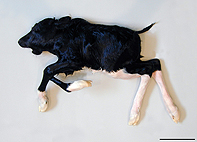Reproduction and Obstetrics
This section works with reproduction of production mammals. In particular, the section focuses on conditions which cause lowered fertility – either because the animals have problems conceiving or because the fetus or the newborn animal is suffering from disease. The expertise of this section is also utilized in studies of human diseases by the use of animal models. Below you can read more about our most important activities, and about who we are.
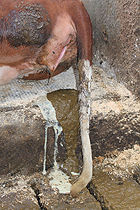
Gulligt flåd fra skeden af en ko
Our primary area of research is infection and inflammation of the genitals, particularly in female animals. We have a research project concerning uterine inflammation in dairy cows, where among other things we investigate how various types of bacteria invades the uterine mucosa after calving. Similarly, we investigate uterine inflammation in mares with a particular focus on the immune response of clinical and sub-clinical infections, as well as their effect on the fertility. Conditions of infection and inflammation in the genitals of pigs are studied in an experimental model, where we infect the pigs with human-pathogenic chlamydia bacteria. This is done in collaboration with the Danish State Serum Institute (SSI) with the aim of developing a vaccine to prevent sexual transmissions of chlamydia between humans.
Since 1987, we have been conducting research concerning birth defects (inheritable and non-inheritable), with the support of agricultural organizations. This project has led to the discovery of such ailments as Complex Vertebral Malformation (CVM) and Brachyspina, which significantly affect cattle breeding across the world. In this project, animals with birth defects are continually examined with the aim of determining the causes.
Q fever is an infectious disease of animals caused by the bacterium Coxiella burnetii. This bacterium can be found in such places as the uterus of pregnant animals and is exerted at birth, whereby it can be transferred to humans (zoonosis). This infection is found in Danish cattle to a large extend. We conduct our research concerning this infectious disease in collaboration with the group Population Biology.
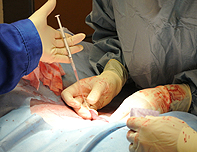
Genetisk modificerede tidligere fostre overføres kirurgisk til en so
Furthermore, we do research to develop genetically modified “test tube” pigs. These pigs have received a human gene, e.g. associated with the development of Alzheimer’s disease. We transfer the embryos to surrogate mothers, which will then carry out the pregnancy and give birth to pigs which are predisposed to developing a “human disease”. These pigs are used in research at the University of Århus.
A large portion of our research is done in the form of PhD projects. If you are interested in receiving a PhD degree within our research areas, you are welcome to contact us.
In the menu on the right, you will find information about our larger research activities, based on e.g. interesting clinical cases or in the form of Masters Projects. If you are a veterinarian with an interesting project, which could form the basis for a Masters project, you are welcome to contact us.
Diagnostics and professional advice
Our interests cover many aspects of infertility and diseases of animals, and if you have an interesting case, you are always welcome to contact us. We are naturally curious, in spite of time- and economic constraints. From our personal profiles, you can see who would be the most relevant person to contact.
Examinations of live animals are performed in collaboration with the animal hospitals of the faculty. We have a close collaboration with the University Hospital for Large Production Animals, where we cooperate with the permanent staff to examine and treat animals with reproductive- or birthing problems. Admission of animals to the hospital, with the intent of examination and treatment, happens when a practicing veterinarian contacts the hospital. See the hospitals website for further details. Examination and treatment of family animals happens by directly contacting the University Hospital for Family Animals. Examination and hormone profiles happen by directly contacting the Central Laboratory.
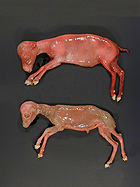 Aborterede tvillinger fra et får
Aborterede tvillinger fra et fårAnimal owners and veterinarians are offered diagnostic help and advisory services in relation to research projects. The extend and the scope of this help is dependent on the individual projects. We have projects concerned with birth defects and inherited defects , Q fever, and abortion and disease of newborn animals. We provide links for the project descriptions, where you can read more.
Due to resource limitations, general advisory services are only offered to a very limited extend, and generally only in relation to our individual areas of expertise. Please see our personal profiles. Requests concerning governmental assignments should be sent to professor Jørgen Agerholm.
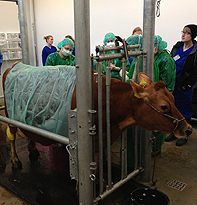 Our teaching is part of the educations of Veterinary Medicine and Livestock Science. From a foundation of the normal conditions of fertility and reproduction, the students learn about the diseases and problems that might emerge before, during, and after pregnancy in both offspring and mother. We teach theory as well as lab- and clinic-based practices. Our vision is that new graduates will be able to handle acute clinical problems in a competent fashion, as well as having a theoretical foundation for understanding and handling the problems that relates to reproduction and obstetrics in production mammals.
Our teaching is part of the educations of Veterinary Medicine and Livestock Science. From a foundation of the normal conditions of fertility and reproduction, the students learn about the diseases and problems that might emerge before, during, and after pregnancy in both offspring and mother. We teach theory as well as lab- and clinic-based practices. Our vision is that new graduates will be able to handle acute clinical problems in a competent fashion, as well as having a theoretical foundation for understanding and handling the problems that relates to reproduction and obstetrics in production mammals.
In addition to the team-based teaching, we take part in individual Bachelors- and Masters Projects. If you wish to make a Bachelors- or a Masters project with us, you are welcome to contact us.
CONTACT
Head of section:
Professor Jørgen Steen Agerholm
Mail: jager@sund.ku.dk
Phone: +45 353-32981
Address:
Højbakkegårds Allé 5A
DK-2830 Taastrup
Phone: +45 3533 2966
RESEARCH PROJECTS
Group members
| Name | Title | Phone | |
|---|---|---|---|
| Anne Dorte Valentin Roed | Laboratory Technician. | +4535332968 | |
| Hanne Gervi Pedersen | Associate Professor | +4535332980 | |
| Heidi Elise Holm | Biomedical Laboratory Scientist | +4535333767 | |
| Jan Bojsen-Møller Secher | Associate Professor | +4535332959 | |
| Jørgen Steen Agerholm | Professor | +4535332981 | |
| Mats H.T. Troedsson | Affiliate Professor | +45+13522835335 | |
| Mette Christoffersen | Associate Professor | +4535332983 | |
| Natacha Ditte Muderspach | PhD Fellow | +4535335059 | |
| Sandra Kathrin Goericke-Pesch | Affiliate Professor |

